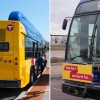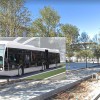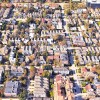
Shaping Africa’s urban areas to withstand future pandemics
In many African cities, the combination of density, widespread financial insecurity and underdeveloped health care systems make them especially vulnerable to being hit hard by COVID-19.

Shaping Africa’s urban areas to withstand future pandemics
In many African cities, the combination of density, widespread financial insecurity and underdeveloped health care systems make them especially vulnerable to being hit hard by COVID-19.

Boom likely to resume but leaders need to square disparities in the Texas Triangle
Despite the current coronavirus-driven economic slowdown and drop in oil prices, Houston continues to be one of the fastest-growing and most prosperous metropolitan areas in America. The metro area continues to add about 100,000 residents annually and has a gross domestic product of a half-trillion dollars per year.

Coronavirus puts those living in flood-damaged homes at greater risk
Many families in the Houston region live in homes with flood damage, of which they may or may not be aware. These residents may face high levels of mold exposure that can lead to lung damage that puts them at a greater risk of severe complications should they become infected with the novel coronavirus.

How the COVID-19 pandemic will change our cities
The SARS-CoV-2 virus has forever changed the world and life as we know it. Once the current pandemic is over, it will also change our approach to where we work, how we get there and more.

Here’s what our cities will look like after the coronavirus pandemic
Editor’s note: This is the first of two posts exploring the long-term effects the COVID-19 crisis will have on the American city. Once we get through this, cities as we know them will be changed forever.

Is non-gentrification the real threat to neighborhoods?
Why are there so few studies charting displacement and cultural decline in non-gentrifying neighborhoods? According to this commentary, the implicit assumption in most gentrification research is that if a neighborhood doesn’t change, it stays the same. And that displacement by decline is much more common and more harmful than displacement due to gentrification.

Sharing the road isn’t radical thinking. Let’s slow down and consider the possibilities.
All day long, cars and trucks speed down Rushmore Boulevard, a high-traffic roadway that separates a pair of lifelong friends in the book “The Busiest Street in Town.” That is, until they decide to take matters into their own hands to slow the traffic and make the street safe for everyone. It may be a children’s book but the story doesn’t have to be a fairy tale.

Here’s how Texas can help today’s students land the jobs of tomorrow
Research consistently shows that higher education pays — for both individuals and society. There’s a direct correlation between the level of postsecondary education and the amount of money a person makes, how much they pay in taxes, their degree of civic engagement and even their health. On average, those with a bachelor’s degree earn 31% more than those with an associate degree and 62% more than those with a high school diploma alone.

What Indy learned when it opened a mostly bus-only rapid transit route
IndyGo opened its Red Line last year, connecting many important parts of Indianapolis along a 60% bus-only rapid transit route.

How BRT service rapidly improved ridership in the Twin Cities
Metro Transit, which operates public transportation service in the Twin Cities metropolitan area, launched the region’s first bus rapid transit line (BRT) in 2016 with its METRO A Line. Last year, a second BRT line was added, and more are planned for the future.

BRT could be a game changer if Metro plays to its strengths
It will take 20 years to implement the METRONext plan but if done correctly, getting riders where they want to go will be the top priority and the entire Metro system will work in concert to provide the best service possible.

State lawmakers need to partner with — not impede — local governments
Texas’ leading political figures have made it clear they don’t have much use for local government. From curbing cities’ ability to generate property tax revenue to a call for banning localities from lobbying in Austin, state officials continue to limit the power of local governments.

Housing vouchers work but more funding is needed to help more families
Research shows housing vouchers lead to improvements for families — children, in particular. Unfortunately, for many in Houston, limits on the program are blocking their access to those opportunities.

How riding Metro every day changed my perspective on transit funding
Houston area voters will decide November 5 whether or not to support Metro’s ballot referendum, which borrows $3.5 billion for system improvements and expansions.

A path forward for social mobility
Almost a year since the Opportunity Atlas was launched, what have we learned about social mobility and how are we moving forward?
Rice University
Kraft Hall
6100 Main Street, Suite 305
Houston, TX 77005-1892